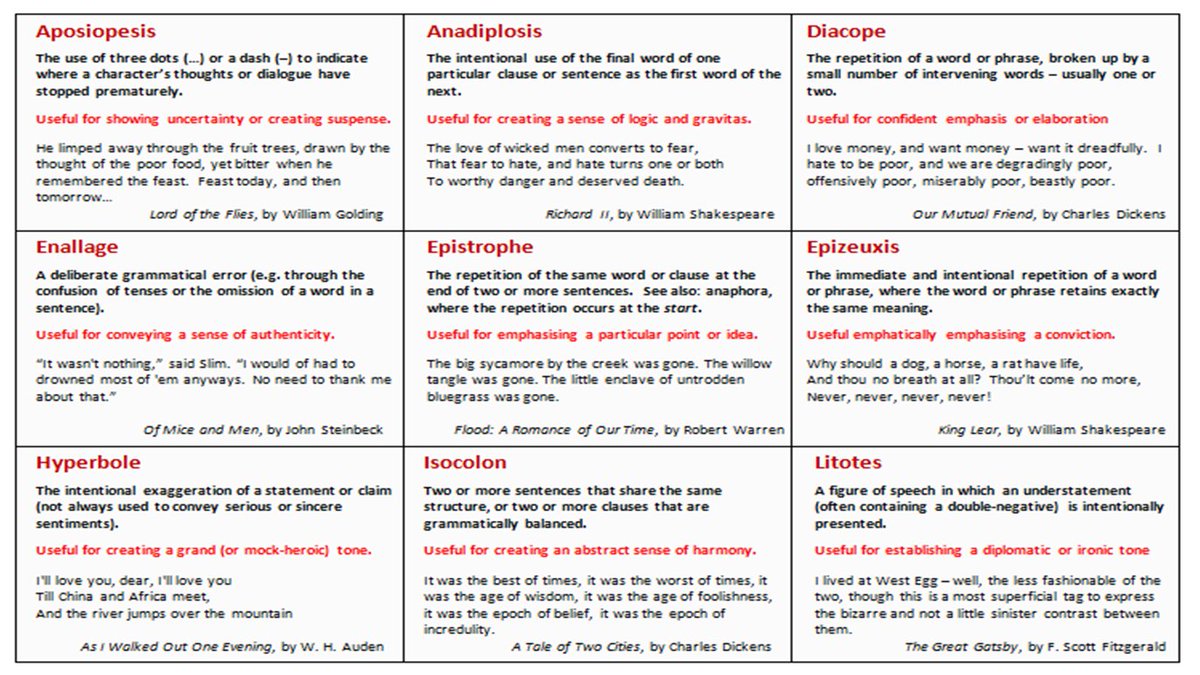
Nov 25, · What Is a Rhetorical Device and Why are They Used? As with all fields of serious and complicated human endeavor (that can be considered variously as an art, a science, a profession, or a hobby), there is a technical vocabulary associated with writing Mar 01, · Throughout the speech the rhetorical devices that were most present were ethos, parallel structure, and hypophora. The author begins the essay by using ethos. She notes that majority of the students for whom the speech is for are current and past student of hers. Giving her credibility to address them since she once taught them Oct 30, · 15 Rhetorical Devices That Will Spice Up Your Essays #1 Alliteration. On Friday, we had fabulous, fiery, fiesta salsa. #2 Anadiplosis. Their dinner was the beginning of a long dining nightmare, a nightmare that would last for hours. #3 Antanagoge. The enchiladas I had for dinner last night were Estimated Reading Time: 6 mins
31 Common Rhetorical Devices and Examples | Merriam-Webster
There are three different rhetorical appeals—or methods of argument—that you can take to persuade an audience: logos, ethos, and pathos. These include ethos, pathos, and logos.
Kairos means taking advantage of or even creating a perfect moment to deliver a particular message. Consider, for example, Dr.
Martin Luther King Jr. In stories, people employ kairos to create a rhetorical devices in essays moment — trying to capture in words what will be immediately applicable, appropriate, and engaging for a particular audience. Kairos is timeliness, appropriateness, decorum, symmetry, balance — being aware of the rhetorical situation. Mark the kairos is fulfilled and the kingdom of God is at hand, rhetorical devices in essays.
Kairos is a persuasive technique that uses takes advantage using the perfect timing to encourage people to act or make a decision. Kairos refers to the opportune moment. People are often more persuaded at different moments in time than others. Kairos is all about finding the opportune time to persuade your audience. If you want to invite people to a party, but you invite them three months in advance, they may forget.
A rhetorical analysis essay is a form of writing where the author looks at the topic rhetorical devices in essays greater detail and prove his standpoint, using effective and persuasive methods. Considered together, these appeals form what later rhetoricians have called the rhetorical triangle.
You must be logged in to post a comment. Begin typing your search term above and press enter to search. Press ESC to cancel. Skip to content Home Philosophy What are 5 rhetorical devices? Ben Davis September 15, Table of Contents, rhetorical devices in essays. READ: Which type of journalism is best? READ: Why is instinct important?
READ: Do Buddhist sacrifice animals? Previous Article Why do I zone out so much? Next Article What is a VCe pattern in the final syllable?
Leave a Reply Cancel reply You must be logged in to post a comment. Home Lifehacks Admission Essay Coursework Assignment Articles Helpful tips Blog FAQ About Contacts. Search for: Begin typing your search term above and press enter to search. Back To Top.
Common Rhetorical Devices
, time: 9:43What are 5 rhetorical devices? – blogger.com

Nov 25, · What Is a Rhetorical Device and Why are They Used? As with all fields of serious and complicated human endeavor (that can be considered variously as an art, a science, a profession, or a hobby), there is a technical vocabulary associated with writing Sep 15, · Here are 5 rhetorical devices you can use to improve your writing: 1- Anaphora: The repetition of a world or a phrase at the beginning of successive classes. 2- Epiphora: The repetition of a word or phrase at the end of successive clauses. 3- Anadiplosis: 4- Polysyndeton: 5- Mar 01, · Throughout the speech the rhetorical devices that were most present were ethos, parallel structure, and hypophora. The author begins the essay by using ethos. She notes that majority of the students for whom the speech is for are current and past student of hers. Giving her credibility to address them since she once taught them

No comments:
Post a Comment